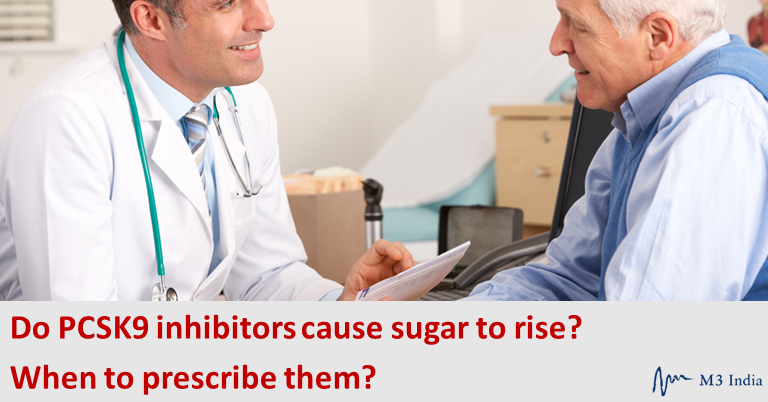Do PCSK9 inhibitors cause sugar to rise? When should they be prescribed?
M3 India Newsdesk Jul 15, 2019
This is an excerpt from the recent webinar 'How and when to consider PCSK9 inhibitors in practice' by Dr. Jamshed Dalal, Cardiologist and Director of Centre for Cardiac Sciences at a prominent Mumbai hospital hosted by M3 India. In this part, Dr. Dalal clears the air on whether PCSK9 inhibitors cause blood sugar rise and explains when they should be prescribed.

Do PCSK9 inhibitors cause sugar to rise?
That’s a big problem with statins. Yes, theoretically, it is possible and with PCSK9, there is some effect in terms of insulin release but it has been looked at in detail. And what can be found is that the inhibition of PCSK9 is not associated with an increase of type 2 diabetes. So unlike statins, PCSK9 does not produce a risk of new-onset diabetes. It’s a very important factor to remember because this has been a worry.
What we really need to do is identify all patients, especially cardiologists whose 80% of patients will fall in the high risk group, physicians or anyone who treats ischaemic heart disease, angina, diabetes, and blood pressure, neurologists who see strokes, surgeons who see peripheral vascular disease. Most of these physicians will have patients with some form of established cardiovascular disease. It is important to remember, it is vascular diseases and not coronary artery disease alone.
So, any vascular disease patient falls into a high-risk group and it is crucial to check whether these patients have had any recent events. If so, the physician should be very aggressive as there could be a greater burden of atherosclerosis.
When to prescribe PCSK9 inhibitors
Let's assume a patient post coronary syndrome presents with LDL cholesterol levels less than 70. Statin therapy with added Ezetamibe can be prescribed. If LDL cholesterol is still not lowered down, PCSK9 inhibitors can be prescribed.
- Now assume the 70 target has changed to 50. I would put all my patients on maximally tolerated dose of statin. It doesn’t matter whether they are on Atorvastatin or Rosuvastatin- those are the two most effective drugs. I add Ezetamibe- a standard dose of 10 mg that doesn’t require any variation. On follow up, if LDL values are below 50, it is a sign of good response.
- If the LDL comes down to between 50 and 60, it would be necessary to talk to the patient, look at the risk factors, see whether they can be given PCSK9 or not.
- If LDL cholesterol still remains in the 70, 80, 90 group, despite maximum tolerated dose of statins and Ezetamibe, PCSK9 inhibitors should be prescribed after speaking to the patient.
As already known, the dose available needs to be used twice in a month as an injectable and it is expensive. However, sometimes, many of these patients don’t take it twice a week, they take it once in three weeks, even once a month. While it is right to do so, even if they are taken once a month, it will bring the patient's LDL cholesterol down to very low levels for 15 days, may be little lower levels for three weeks, and after 4 weeks it will go up. Hopefully, patients will take the second injection by that time. Of course, patients will always continue the statins and Ezetamibe as well.
There is also another concern cropping up nowadays, patients enquire if they should be taking statins, because someone they know- a friend or relative was advised to discontinue statins, because they are apparently not good for patients. Or, if the patient's LDL is already 60, they enquire as to why their dose of statins cannot be reduced. In situations such as these, it is important to explain to the patient, the importance of these drugs and the sufficient data that supports their usage.
This article is a transcript of the webinar by Dr. Jamshed Dalal, titled, 'How and when to consider PCSK9 inhibitors in practice'. Click here to watch.
Stay tuned for the next part on Q&A session on PCSK9 inhibitors
To read the first part of the transcript, click Which patient populations should one target for PCSK9 Inhibitors?: Dr. Jamshed Dalal
To read Dr. Jamshed Dalal's article on PCSK9 inhibitors, click Role of PCSK9 inhibitors in the aggressive management of atherosclerotic vascular disease: Dr. Jamshed Dalal
Disclaimer
This document is a transcription of a portion of the webinar, produced for audience with bandwidth limitations that could possibly restrict them from viewing the video. While it is believed to be accurate, it is not warranted to be so. Divergence in format is to be expected.
The views and opinions expressed in this article are those of the author's and do not necessarily reflect the official policy or position of M3 India.
-
Exclusive Write-ups & Webinars by KOLs
-
Daily Quiz by specialty
-
Paid Market Research Surveys
-
Case discussions, News & Journals' summaries